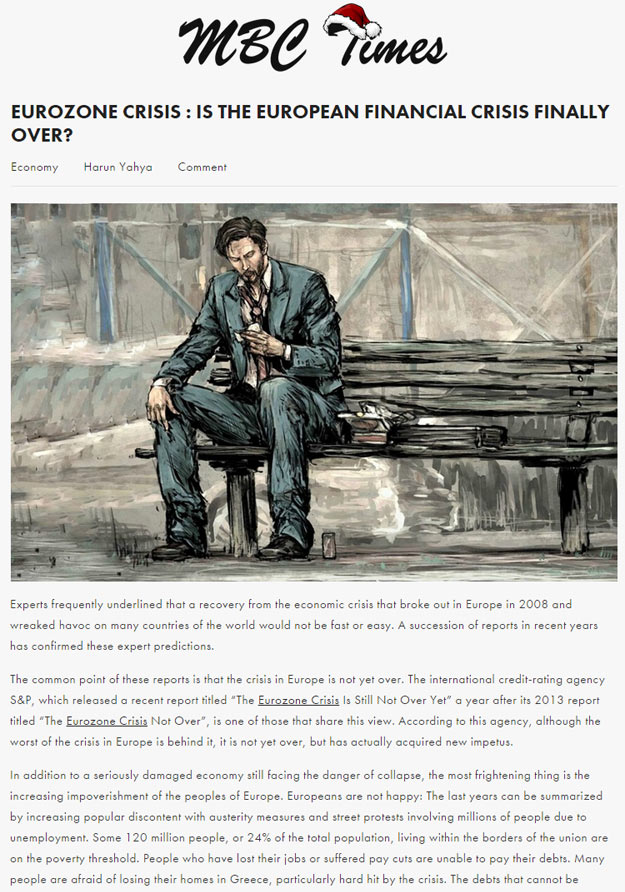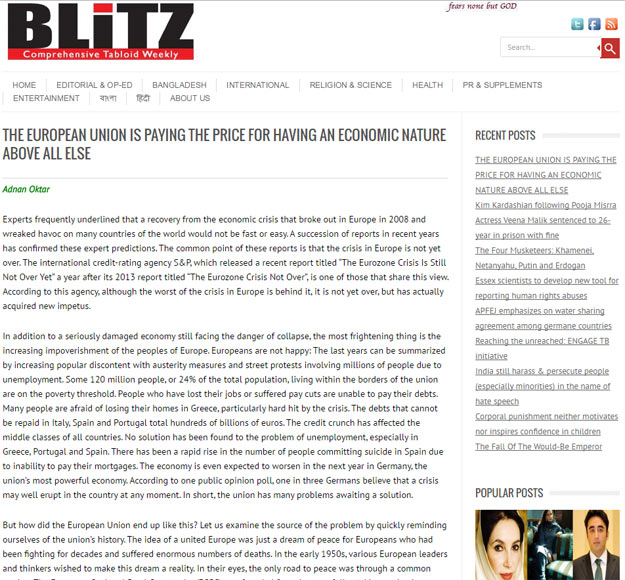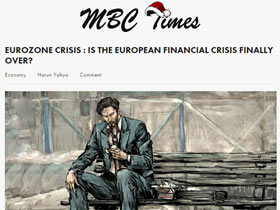
Experts frequently underlined that a recovery from the economic crisis that broke out in Europe in 2008 and wreaked havoc on many countries of the world would not be fast or easy. A succession of reports in recent years has confirmed these expert predictions.
The common point of these reports is that the crisis in Europe is not yet over. The international credit-rating agency S&P, which released a recent report titled “The Eurozone Crisis Is Still Not Over Yet” a year after its 2013 report titled “The Eurozone Crisis Not Over”, is one of those that share this view. According to this agency, although the worst of the crisis in Europe is behind it, it is not yet over, but has actually acquired new impetus.
In addition to a seriously damaged economy still facing the danger of collapse, the most frightening thing is the increasing impoverishment of the peoples of Europe. Europeans are not happy: The last years can be summarized by increasing popular discontent with austerity measures and street protests involving millions of people due to unemployment. Some 120 million people, or 24% of the total population, living within the borders of the union are on the poverty threshold. People who have lost their jobs or suffered pay cuts are unable to pay their debts. Many people are afraid of losing their homes in Greece, particularly hard hit by the crisis. The debts that cannot be repaid in Italy, Spain and Portugal total hundreds of billions of euros. The credit crunch has affected the middle classes of all countries. No solution has been found to the problem of unemployment, especially in Greece, Portugal and Spain. There has been a rapid rise in the number of people committing suicide in Spain due to inability to pay their mortgages. The economy is even expected to worsen in the next year in Germany, the union’s most powerful economy. According to one public opinion poll, one in three Germans believe that a crisis may well erupt in the country at any moment. In short, the union has many problems awaiting a solution.
But how did the European Union end up like this? Let us examine the source of the problem by quickly reminding ourselves of the union’s history. The idea of a united Europe was just a dream of peace for Europeans who had been fighting for decades and suffered enormous numbers of deaths. In the early 1950s, various European leaders and thinkers wished to make this dream a reality. In their eyes, the only road to peace was through a common market. The European Coal and Steel Community (ECSC) was founded first; that was followed in turn by the European Economic Community, the European Atomic Energy Community, the European Community, the Customs Union and the European Union. With globalization, it was recognized that it was not enough to be an economic power and they decided on political integration, as well. The union expanded to the south, and the number of members grew. Another wave of expansion followed the adoption of a common currency in Europe, the Euro, in 2002. The number of member countries finally reached 28 with the accession of Croatia.
‘Coal and steel’ represented a means to the peace desired with the foundation of the ECSC. It was said that the reason for that was the hope that the unification of the coal and steel industries of France and Germany, which had fought against each other down the ages, would prevent disagreements that might arise over these raw materials, making it impossible for the two countries to go to war. Yet it was clear that the structure of a united Europe was built on unsound foundations right from the start. The means to peace should have been pure love. As with the rest of the world, love, friendship and brotherhood were one of Europe’s greatest needs at that time, and that remains the case today. Although experts generally regard the problems in the EU from an economic perspective, the underlying problem is that the union is not built on love and brotherhood, but is an economic and political union based on economic foundations. Yet union means friendship, brotherhood and unity, and sharing everything together. It means solidarity and self-sacrifice. If there is unity somewhere, there will also be love, peace and prosperity. The basic means to union is love, otherwise known as devotion, acceptance and not regarding oneself as better than others but as equal to them. People will inevitably be unhappy in a ruthless system built around a materialist way of thinking and on self-interest . Mutual aid will cease, and this will obviously result in a climate of terrible insecurity. There can be no question of unity, health and order in such a place. Had European Union been one built on love and friendship, it would not have regarded economically less developed countries as weak links, but as brothers needing to be helped out and rescued. Had the members of the union been bound to one another in love and fervor under all circumstances, such a union could never have been weakened or suffered a loss of stability. Only then could it have avoided material and psychological collapse, and indeed could have grown even stronger. The way out of the grave difficulties facing the EU is to adopt that objective as a matter of urgency; to cease being a union of self-interest and to strive with a sincere effort to become a union of love, friendship and brotherhood.
Adnan Oktar's piece on Blitz & MBC Times:



